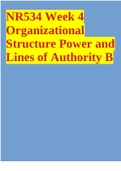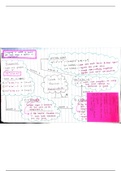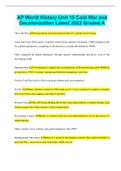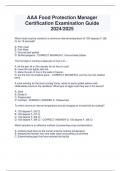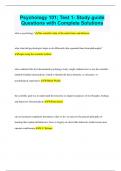Macbeth Quotes
Act 1, Scene 1
“Fair is foul, and foul is fair.”
Who: The Witches
Context: The witches are concluding their meeting.
Significance: fair and foul mean the opposite, this quote blurs the line between good and
evil.
“When the battle’s lost and won”
Who: second witch
Context: after the witches decide when to meet again
Significance: when there is a battle there is always one group winning and one group losing.
Setting the tone for the play.
Act 1, Scene 2
“What bloody man is that?”
Who: King Duncan
Context: King Duncan's response upon seeing a sergeant.
Significance: Establishes the play's theme of war and the consequences of violence.
“For brave Macbeth—well he deserves that name”
Who: sergeant
Context: sergeant reporting to king Duncan about Macbeths acts in the war.
Significance: This quote is ironic because it shows that Macbeth is viewed as a noble hero in
the beginning of the play.
"O valiant cousin! worthy gentleman!"
Who: King Duncan
Context: King Duncan says this line in response to a report from a captain about Macbeth's
bravery and effectiveness in battle against the forces of Norway and the traitorous Thane of
Cawdor.
significance: This quote signifies King Duncan's high regard for Macbeth, praising his bravery
and valor in battle. It establishes Macbeth's noble status and valor at the start of the play,
highlighting the tragic fall he will later experience. The irony lies in Duncan's inability to see
the ambition and potential treachery in Macbeth, setting the stage for the play's exploration
of appearance versus reality.
, Act 1, Scene 3
"So foul and fair a day I have not seen."
Who: Macbeth
Context: Macbeth's first line in the play, said to Banquo.
Significance: This echoes the witches' words and foreshadows Macbeth's own descent into
moral ambiguity.
Forshadowing
"All hail, Macbeth, hail to thee, Thane of Glamis!"
Who: The Witches
Context: when the witches are prophesying Macbeth's future.
significance: This is part of the witches' prophecies, which play a crucial role in motivating
Macbeth's actions.
"Stay, you imperfect speakers, tell me more."
Who: Macbeth
Context: This line is spoken by Macbeth immediately after the witches have prophesied that
he will become Thane of Cawdor and eventually the King of Scotland. The witches are
beginning to vanish as Macbeth speaks these words.
Significance: This quote shows that Macbeth thinks he is in power over the witches while he
is not. Macbeth's request to the witches to stay and explain their prophecy shows his
immediate intrigue and interest in their words. This moment is significant because it marks
the beginning of Macbeth's ambition being stirred by the witches' predictions. It also
highlights the theme of the supernatural in the play and Macbeth's susceptibility to believing
in and being influenced by these otherworldly elements. The term "imperfect speakers"
underscores the ambiguous and incomplete nature of the witches' prophecies, which is a
recurring motif throughout the play.
"If good, why do I yield to that suggestion Whose horrid image doth unfix my hair..."
Who: Macbeth
Context: after the witches' prophecy.
Significance: Macbeth's internal conflict begins here, as he contemplates the implications of
the witches' prophecy.
“What! Can the devil speak true?”
Who: Banquo
Context: Banquo reacts to Macbeth's new title, which was predicted by the witches.
Significance: Indicates the dangerous nature of trusting the supernatural.
Act 1, Scene 1
“Fair is foul, and foul is fair.”
Who: The Witches
Context: The witches are concluding their meeting.
Significance: fair and foul mean the opposite, this quote blurs the line between good and
evil.
“When the battle’s lost and won”
Who: second witch
Context: after the witches decide when to meet again
Significance: when there is a battle there is always one group winning and one group losing.
Setting the tone for the play.
Act 1, Scene 2
“What bloody man is that?”
Who: King Duncan
Context: King Duncan's response upon seeing a sergeant.
Significance: Establishes the play's theme of war and the consequences of violence.
“For brave Macbeth—well he deserves that name”
Who: sergeant
Context: sergeant reporting to king Duncan about Macbeths acts in the war.
Significance: This quote is ironic because it shows that Macbeth is viewed as a noble hero in
the beginning of the play.
"O valiant cousin! worthy gentleman!"
Who: King Duncan
Context: King Duncan says this line in response to a report from a captain about Macbeth's
bravery and effectiveness in battle against the forces of Norway and the traitorous Thane of
Cawdor.
significance: This quote signifies King Duncan's high regard for Macbeth, praising his bravery
and valor in battle. It establishes Macbeth's noble status and valor at the start of the play,
highlighting the tragic fall he will later experience. The irony lies in Duncan's inability to see
the ambition and potential treachery in Macbeth, setting the stage for the play's exploration
of appearance versus reality.
, Act 1, Scene 3
"So foul and fair a day I have not seen."
Who: Macbeth
Context: Macbeth's first line in the play, said to Banquo.
Significance: This echoes the witches' words and foreshadows Macbeth's own descent into
moral ambiguity.
Forshadowing
"All hail, Macbeth, hail to thee, Thane of Glamis!"
Who: The Witches
Context: when the witches are prophesying Macbeth's future.
significance: This is part of the witches' prophecies, which play a crucial role in motivating
Macbeth's actions.
"Stay, you imperfect speakers, tell me more."
Who: Macbeth
Context: This line is spoken by Macbeth immediately after the witches have prophesied that
he will become Thane of Cawdor and eventually the King of Scotland. The witches are
beginning to vanish as Macbeth speaks these words.
Significance: This quote shows that Macbeth thinks he is in power over the witches while he
is not. Macbeth's request to the witches to stay and explain their prophecy shows his
immediate intrigue and interest in their words. This moment is significant because it marks
the beginning of Macbeth's ambition being stirred by the witches' predictions. It also
highlights the theme of the supernatural in the play and Macbeth's susceptibility to believing
in and being influenced by these otherworldly elements. The term "imperfect speakers"
underscores the ambiguous and incomplete nature of the witches' prophecies, which is a
recurring motif throughout the play.
"If good, why do I yield to that suggestion Whose horrid image doth unfix my hair..."
Who: Macbeth
Context: after the witches' prophecy.
Significance: Macbeth's internal conflict begins here, as he contemplates the implications of
the witches' prophecy.
“What! Can the devil speak true?”
Who: Banquo
Context: Banquo reacts to Macbeth's new title, which was predicted by the witches.
Significance: Indicates the dangerous nature of trusting the supernatural.


